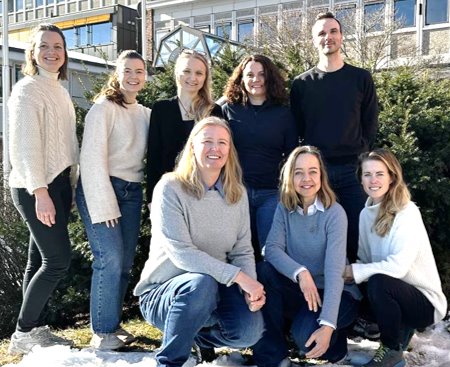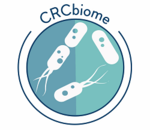About the project
Research group
Trine Rounge, Professor/PI
Paula Berstad, Senior Researcher/PI
Einar Birkeland, Researcher
Ekaterina Avershina, Researcher
Paula Istvan, Postdoc, Scientia Fellow
Cecilie Bucher-Johannessen, Phd candidate
Ane Sørlie Kværner, Postdoc
Maja Jacobsen, Project coordinator
Duration
2017-2034
REC
The project is approved by the Regional Committees for Medical and Health Research Ethics, Project no. 63148
Funding
The project is funded by the Norwegian Cancer Society and by the Norwegian South Eastern Health Authorities.
Funded 2019
Funded 2021

Funded Open Call 2017
Funded Open Call 2018
Background
Colorectal cancer (CRC) symptoms are unspecific - often emerging when the disease is no longer curable. Screening reduces CRC mortality, but current screening tests need improvement to be more accurate and less costly and invasive. CRC is one of the cancer types with strongest association with lifestyle, and there is reason to believe that this association is partly mediated trough the bacteria in the gut, - the microbiota.
We are investigating interactions between CRC, lifestyle and microbiota to better guide prevention of CRC and increase the biomarker performance.
Project aims
The overall aim of the CRCbiome study is to discover gut microbiota biomarkers for colorectal cancer screening. To reach the overall aim we have defined the following sub-aims:
- Identify associations of the gut microbiome with advanced neoplasia, defined as presence of advanced adenoma or CRC.
- Examine interactions of the gut microbiome with host factors, diet, lifestyle and medication use on advanced neoplasia risk.
- Describe modifications of the gut microbiome following removal of precursor lesions of CRC.
The project have established a cohort including a biobank with fecal samples and biopsies, lifestyle information and data from national health registries for use in future studies. Read more about the study design and data in the cohort paper.
The CRCbiome multi-omics
In a project starting up in 2022, we are integrating the data from the microbiome with epigenome, transcriptome, clinical and lifestyle data from study participants, aiming to improve the understanding of CRC development.
- We are taking an in-depth look at the extended gut microbiome, including bacteria, viruses, phages, fungi and their interactions and how this interplay relates to colorectal cancer.
- We will also investigate the epigenome of tissue samples removed during colonoscopy to identify associations and correlations between epigenomic profiles of precursor lesions with clinical factors, gut microbiome and blood transcriptome biomarkers. Read more about this project here.
Design and infrastructure
The CRCbiome study have recruited participants enrolled in the Bowel Cancer Screening in Norway (BCSN) study - a pilot for the national colorectal cancer screening program. Near 3000 screening participants with a positive Fecal immunochemical (FIT) test was invited to participate in our study. Before the colonoscopy, the study participants were asked to fill in a lifestyle- and demographics questionnaire and a validated food frequency questionnaire, developed at the University of Oslo. Neoplastic lesions detected as part of the screening examination was removed during colonoscopy. Two and twelve months after the colonoscopy, the participants were asked for a new FIT test. With this it is possible to investigate whether the microbiome changes after the removal of any precursors to cancer.

Project status
The recruitment of study participants started in September 2017 and is now finished with a total of 1640 participants. The questionnaires data is completed and quality checked. The DNA extraction protocol is finished, and all the samples have been sequenced. We have established bioinformatic pipelines and started analyzing the metagenome data. In 2022 the majority of the group relocated from the Cancer Registry of Norway to the University of Oslo, Centre for Bioinformatics and the Department of Pharmacy.
Paula Istvan started as an affiliated postdoc in November 2020. She studies the viruses in the gut from the fecal samples of the participants (the FIT virome). Einar Birkeland started as a postdoc in March 2020 and is now a researcher on the project. He works with the metagenome analyses. Cecilie Bucher-Johannessen started as PhD student in March 2020. She investigates sex differences in gut microbiota and CRC and interactions with antibiotic use. Ane Sørlie Kværner started as a postdoc in August 2019. She works with lifestyle and diet analyses. Ekaterina Avershina started as a researcher in May 2022. She will be working with tissue
epigenomics of precursor lesions. Maja Jacobsen started in May 2022 as the project coordinator and lab engineer.

How to get access to data
All research projects that includes information from CRCbiome must comply with the EU’s General Data Protection Regulation (GDPR). This means that the processing must have approval from the Regional Committee for Medical Research in Norway (REC). Furthermore the processing needs legal basis according to GDPR Article 6 and 9. The applicant must have considered the need for a Data Protection Impact Assessment (DPIA) according to GDPR article 35. The applicant must prove that these requirements have been met before the data can be made available. Disclosure of information to countries outside the EU requires that the conditions in GDPR are met. To apply for access to data from the CRCbiome study the applicant must fill out this form: Data access application form. For more information, or submission of the application form, email: t.b.rounge@farmasi.uio.no
Collaboration
Giske Ursin, Director, Cancer Registry of Norway
Kristin Ranheim Randel, Head of The Colorectal cancer Screening Section, Cancer Registry of Norway
Geir Hoff, Researcher
Edoardo Botteri, Researcher, Cancer Registry of Norway
Torbjørn Rognes, Professor, University of Oslo
Eivind Hovig, Professor, University of Oslo and Oslo university Hospital
Hanne Cecilie Winther-Larsen, Professor, University of Oslo
Ole Herman Ambur, Associate Professor, Oslo and Akershus University College of Applied Sciences.
Robert Lyle, Core Facility Leader/Senior Scientist, Norwegian Sequencing Centre.
Richard Landberg, Professor, Chalmers University of Technology, Gothenburg, Sweden.
Willem de Vos, Professor, University of Helsinki and Professor Wageningen University
Anette Hjartåker, Professor, University of Oslo
Scott Bultman, Associate Professor, University of North Carolina at Chapel Hill
Vahid Bemanian, Senior engineer/researcher, Akershus University Hospital
Pekka Ellonen, Technology lab at FIMM, Helsinki, Finland
Per Hoffman, CCO at Life & Brain GmbH and Head of Research Platform Genomics, University Hospital Bonn, Germany
Mingyang Song, Ass. Prof, Harvard T.H. Chan School of Public Health.
Hege Salvesen Blix, Professor, University of Oslo, Researcher NIPH
Øyvind Holme, Researcher, Hospital of Southern Norway
Siv Kjølsrud Bøhn, Associate professor, NMBU
Alessio Naccarati, Senior Researcher, Italian institute for Genomic Medicine

